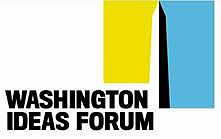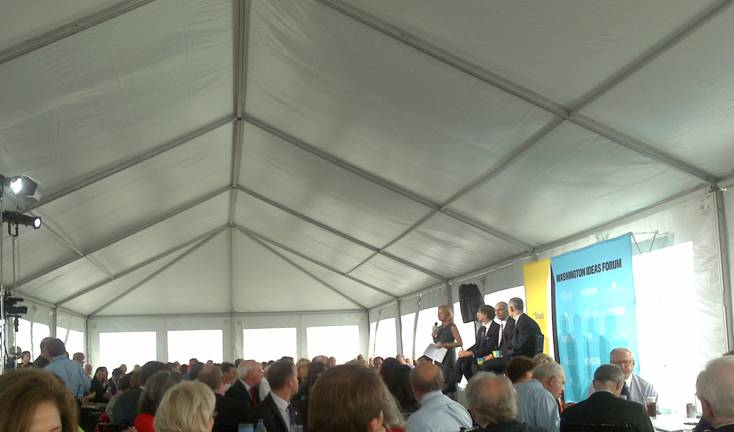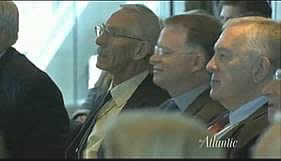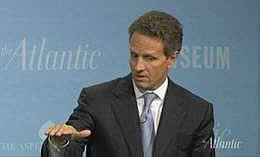While he did not criticize Republicans, Geithner called on them to take greater responsibility. "These are things we need Congress to act on, and for Congress to act we need Republicans who can work with us," he said. "We're gonna have to hold them to that."
Discussing both the administration's performance so far and its plans going forward, Geithner repeatedly cited examples where bipartisan cooperation had led to productive economic policies and where Congressional gridlock had delayed what he described as necessary reforms. He praised Republicans for supporting some past economic efforts and called Obama's cooperation with the outgoing Bush administration during transition "the noble and important thing to do."
Geithner said of Troubled Asset Relief Program, "I think that was the last program that had a meaningful level of bipartisan support," adding that passing TARP was deeply difficult politically. He warned that trying to "drift through" the ongoing economic problems would ultimately be "much more expensive and much more costly to the country." Geithner added, "The challenges we now face going forward are very different than the challenges we faced two years ago. We're still in a crisis by any broad sense, but we're not in a global financial panic."
When asked about the Republican "pledge," Geithner replied, "It's hard to evaluate because it's really just a press release, it's not really an economic policy."
______________________________________________________________________________________________________________________________________________________________________________________________________________________________________________________________________________
Washington Ideas Forum brings insiders, luminaries and media together,
October 5, 2010
George Mocharko,
Staff Writer, The Stylus
Friday, October 1, 2010
Washington D.C.— The 2010 Washington Ideas Forum, which took place September 30 to October 1, brought together high level government figures, businesspeople, and the news media for a salon-styled event. The event, presented by The Atlantic in partnership with the Aspen Institute took place at the Knight Conference Center at Washington, D.C.’s Newseum. It was a veritable who’s who of those shaping the policy debates of today.
The two-day seminar included key Obama administration officials such as U.S. Treasury Secretary Timothy Geithner, Secretary
of Education Arne Duncan, Senior Advisor to the President David Axelrod and Domestic Policy Advisor to
the President Melody Barnes. White House Chief of Staff Rahm Emmanuel, who was originally scheduled to be in attendance, was noticeably absent as the announcement of his departure was just breaking.
Political and business figures presenting included Senators Lindsay Graham and Jim Webb, New York Mayor Michael Bloomberg and Mississippi Governor Haley Barbour, plus David Rubenstein, co-founder of private equity firm The Carlyle Group, economist N.N. Taleb, attorneys Kenneth Feinberg and Bob Bennett, tech-guru Craig Newmark, and lobbyists Tony and Heather Podesta.
The event followed a Q & A format with the questions posed by prominent news media attending and the conversations and interview offered insight into today’s important policy topics.
International and national security issues were also on the table for much of the event. New York Times reporter David Rohde recounted his kidnapping by the Taliban in harrowing detail. AfPak Envoy Richard Holbrooke spoke to Christiane Amanpour about developments in the region. Dr. Ahmed Chalabi, leader of the Iraqi National Congress spoke about the religious influence on Iraqi society stating “The sectarian divide in Iraq is not about theology; it is about power and about power structure.”
Former Director of National Intelligence Mike McConnell, spoke on the emerging issues in cyber security. “The economy of the United State last year was 14 Trillion dollars,” warned McConnell. “There are 2 banks in New York City that move 7 trillion dollars a day. What backs up that money? There’s no gold. There’s no printed dollars.”
There were plenty of candid moments at the Forum as well. When New York City Mayor Michael Bloomberg was asked by Chris Wallace of Fox News Sunday whether he would run for president, he responded much like Calvin Coolidge would, with two words: “Can’t win.”
Google CEO Eric Schmidt, who took the stage less than an hour after Tony and Heather Podesta spoke, reminded the crowd of the information divide outside the beltway by claiming “the American public doesn’t realize how many of the laws are written by lobbyists.”
Director Spike Lee, who directed a new film about Hurricane Katrina called, “If God Is Willing and da Creek Don’t Rise,” claimed that Homeland Security Secretary Michael Chertoff was irresponsible in his duties with Michael Brown of FEMA as the fall guy. “People are dead now because he didn’t do his job,” said Lee.
Brian Williams, anchor of NBC News, grilled David Axelrod about the government’s sluggish response to the BP Oil spill and in particular leveled a charge against the President. “Out there there in the country there are people who saw ‘hope’ on the website and clicked on it. And heard ‘change’ and voted for it, and today want to know what happened to that…” Williams continued, “The perception is, and this is not breaking news to you, that you’ve gone Washington.”
“The going Washington suggestion implies that you are doing things to perpetuate yourself in power,” said Axelrod, who is leaving the administration next Spring. “If we were focused on our own interests, we wouldn’t have done any of the things that we did,” referring to the administration’s tough stands it took on Wall Street and health care reform. Yet in the post 9/11 world, “A lot of people are waiting for Barack Obama’s bull horn moment,” said Williams.
If The Washington Ideas Forum continues creating great dialogue and debate like this, it will certainly give other events of its caliber a run for its money—perhaps even trumping its predecessor, the Aspen Ideas Fest. |






